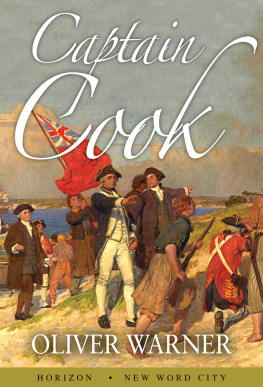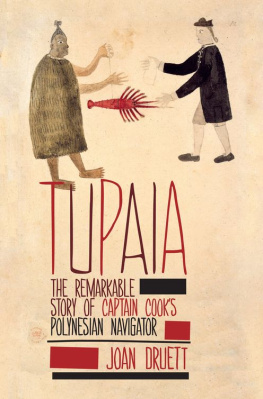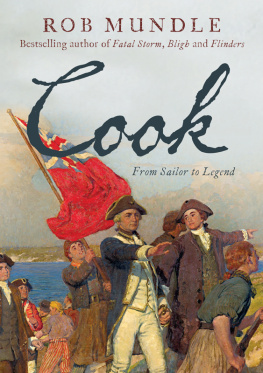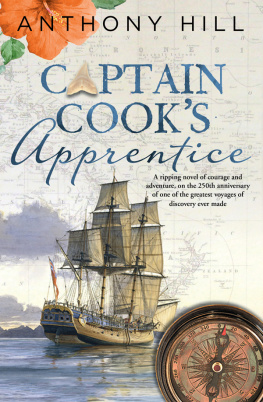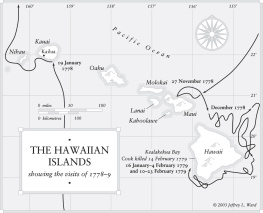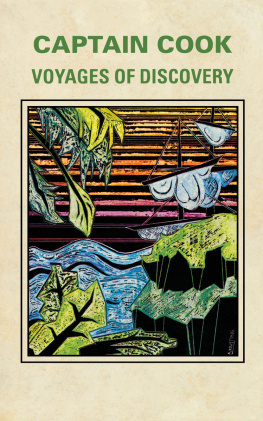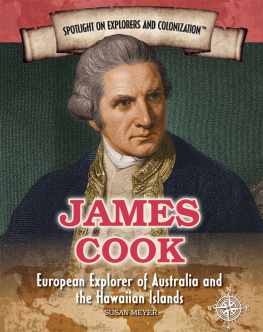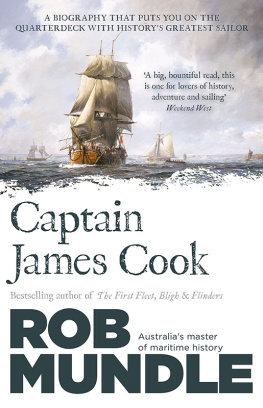James Cook once described himself as a man who had ambition not only to go farther than anyone had done before but as far as possible for man to go... These words not only sum up his professional aspirations but also give a rare, personal glimpse of the man himself.
Cook had a piercing curiosity, but he was no visionary seafarer like his great predecessor Ferdinand Magellan. Cook was a methodical explorer with the soul of a scientist. He was born into an age when the search for scientific knowledge was as intense as the thirst for conquest had once been.
By the 1700s, England, eager to expand its empire, was sending exploring parties to all the corners of the then-known globe, and the most daring into the still unknown. The eighteenth century, the age of reason and enlightenment, required a new kind of explorer: not a rover or a plunderer, or a seeker of adventure for its own sake, but a master of navigation and seamanship. An explorer was expected to be a skilled surveyor and chart maker, with natural curiosity and a flair for command. Cook was that man.
He was born on October 27, 1728, in a two-room clay cottage in the remote Yorkshire village of Marton. His father, also named James, was a day laborer who did such odd jobs as slopping hogs. On one of his jobs, he met Grace Pace, who was eight years younger. Four months after they were married, she gave birth to their first son, John.
James, the second of eight children, was a bright youngster, so much so that his fathers employer financed his early schooling. Jamess father had been promoted to foreman at the largest farm in the region. Young James, like other sons of farmers, was expected to follow in his fathers footsteps.
But James rebelled as a boy, preferring solitude to the bustle of the farm. He often wandered off to explore the wilderness around it - collecting specimens, particularly birds nests, which fascinated him with their intricate structure. From an early age, James Cook had a restless spirit that refused to be confined and longed to range free.
At school, his instructors saw him as a charismatic loner with a steady adherence to his own schemes, but also something in his manners and deportment which attracted the reverence and respect of his companions.
As he grew older, James worked on the farm with his father, though he quickly realized there was no future in it for him. He looked up to some of the men on the farm - including its owner, Thomas Skottowe, who was paying for his schooling - and never forgot the work ethic he learned there. But in 1745, when his formal education ended, James was ready to set out on his own path.
His father found him a job with a shopkeeper in Staithes, a tiny fishing village northwest of Whitby. He spent most days stocking shelves and weighing fish. The fishermen who came into the shop regularly told stories about their adventures in the North Sea, and young James craned his neck to listen. At night, James slept under the shops counter. By candlelight, he pored over books he had stacked there - on geography, astronomy, and mathematics - and dreamed about far-off realms.
The shop was close to the sea, within sight of ships sailing to and from the nearby port of Whitby, and within earshot of surf pounding the rocky shore. It was here that James developed his lifelong love of the sea, spending summers on the water and winters learning the shipwrights craft.
Cooks preference for seafaring was obvious to everyone. In September 1746, his employer at the shop graciously arranged for him to interview with a shipping firm owned by John and Henry Walker.
The Walkers were prominent coal shippers who ran coal-carrying vessels, called colliers, between London and the Yorkshire towns along the North Sea coast. At the time, Whitby was a coastal-trade center as well as an important shipbuilding site. Cook arrived flush and tired after hiking, with all of his belongings in a pack slung over his shoulder, about a dozen miles along a trail that skirted the rugged coastline. He rushed to the waterfront to gaze out at the armada of cargo ships - many from foreign ports with crews that came ashore speaking unfamiliar languages. From Whitby, he realized, it would be easy enough to fulfill his desire to roam.
Cook entered John Walkers office and asked for a job. Though more than six feet tall, Cook had a fresh face and awkward innocence that worried Walker. The boy seemed a stark contrast to the hardened and weathered sailors in Walkers outfit. Impressed by Cooks eagerness to learn, however, Walker decided to hire him as an apprentice - though seventeen generally was considered too old to begin an apprenticeship and Cook was nearly eighteen.
Cook reported to his first ship, the collier Freelove. While docked, he learned the menial jobs assigned to all young ship hands: swabbing the deck, polishing the hull, and cleaning the latrines. He also came to grasp the names and purposes of the various ropes, knots, and sails that would be essential on the open sea. He was issued a hammock that he hung in the ships hold - next to those of other apprentices, with whom he was now competing for advancement.
Before the year was out, Cook was at sea on his first voyage, hauling coal along the British coast. For each of the next three years of his apprenticeship, he made at least a dozen such voyages. He transferred to another of Walkers ships, the Three Brothers, and then others. Quickly, he learned to handle the awkward but capable colliers and sail them safely in dangerous waters. Soon he was sailing on open-ocean passages across the North Sea. When not at sea he studied math and astronomy. Cook served nine years in the North Sea trade, earning promotions to able seaman, mate, and then second-in-command of his ship for the last three years.
He learned to trust his instincts. Coastal charts were unreliable, and a seaman needed a sixth sense to protect his ship from shoals, sandbanks, and changes of current. Cook was unusually perceptive. He gained a reputation for sailing where other navigators dared not go; he seemed to know instinctively which waters were safest. His officers often said that he could smell land; he would appear suddenly on deck and alter his ships course when no one else was aware that there was danger of running aground.
Cook served the Walkers of Whitby so well that in 1755 he was offered command of one of their colliers - the best and largest ship in the fleet, the Friendship. But at twenty-seven years old, he wanted a change. England was mobilizing its forces in preparation for war with France, and its navy was desperate for recruits. Cook recognized the need for experienced seamen, and at the same time, saw the possibility of advancing his career at sea. He rejected Walkers offer, saying he intended to join the Royal Navy.
In his jaunts to London, on coal business, Cook had seen Royal Navy officers - in their powdered, white wigs, polished shoes, and blue-and-gold uniforms - and their superior vessels. Walker warned Cook that an officers life was not as glamorous as it might seem: The ranks of the Royal Navy were filled with derelicts, pressed into service, who knew nothing about life at sea, and so were doomed to die there. Many succumbed to disease, the worst culprit being scurvy.
Walker tried other arguments. A Royal Navy officer might be at sea for years before receiving any compensation. But the best reason for staying put, Walker said, was that in Whitby, Cook would be a captain. If he joined the Royal Navy, he would be starting over as an ordinary seaman. Officers were recruited from the upper class, and groomed at a young age. But Cook craved adventure and the distant horizons that could be reached aboard the larger Royal Navy barque. I want to make my future fortune there, he told Walker as he walked out of his office and away from Whitby.

